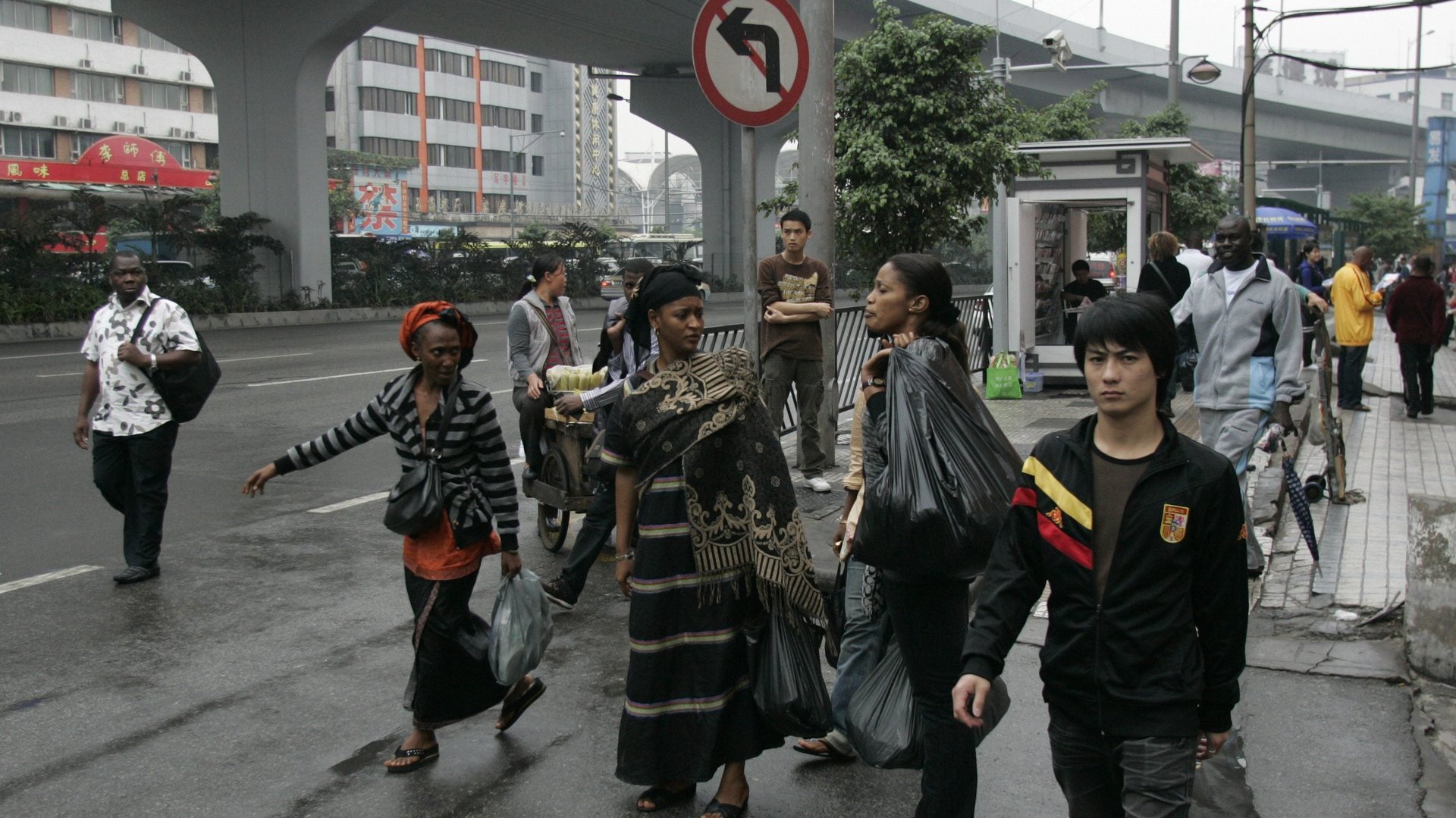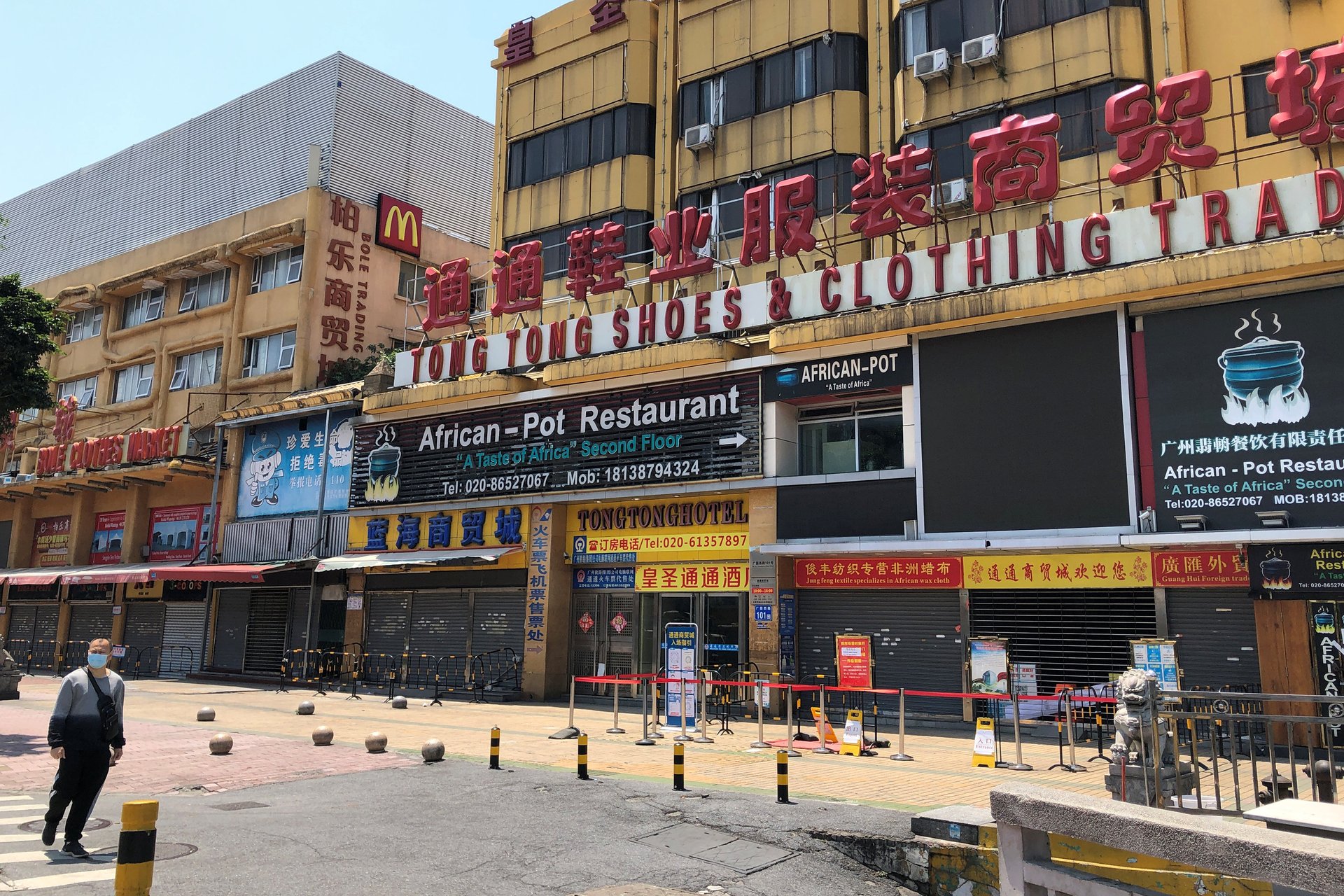The mistreatment of Africans in Guangzhou is a big threat to China’s coronavirus diplomacy
Videos showing the recent mistreatment of Africans living in the Chinese city of Guangzhou have ricocheted around African broadcast and social media in recent days.


Videos showing the recent mistreatment of Africans living in the Chinese city of Guangzhou have ricocheted around African broadcast and social media in recent days.
Guangzhou, the capital of Guangdong Province in southern China, is closely linked to Hong Kong and Macau, and has the largest African community in Asia. The majority are from the West African countries of Nigeria, Ghana and Mali. As a pioneering city at the heart of China’s economic reform, Guangzhou is the hub of the country’s export-driven manufacturing sector, an industry which has always been considered open, tolerant and progressive.
But amid fear of imported coronavirus cases and a second wave of the pandemic in China, the local government implemented surveillance and mandatory testing and an additional 14-day quarantine for all African nationals in the city, regardless of whether they tested positive for COVID-19. These measures paid no regard to whether people had recently travelled out of China, or how they would be mistreated by landlords, hotel managers and shopkeepers.
As a result, many Africans in Guangzhou, including Nigerians, Ugandans and Ghanaians, have been subject to unfair treatment. Some have being evicted by landlords or rejected by hotels, and some even left homeless. The city, and the government in Beijing, are now facing a full-blown diplomatic crisis and PR disaster amid accusations of racism. A group of African ambassadors in Beijing wrote a letter of complaint to the Chinese government about the “stigmatization and discrimination” being faced by Africans. Other African diplomats, facing domestic pressure, have held discussions with representatives from China’s Ministry of Foreign Affairs.
Many African countries will be particularly disappointed given how much their diplomats have spoken up for China on the international stage. African governments have supported China on issues including its membership of the UN in the 1970s, territorial disputes in the South China Sea and treatment of Uighurs in Xinjiang.
In recent weeks, China has been working hard on its “coronavirus diplomacy” to show it is on the path to recovery from the pandemic. Such incidents threaten its propaganda battle. In Kenya, the hashtag #DeportRacistChinese was trending on Twitter in mid April after Kenyan internet users saw reports of Kenyans and other Africans being treated unfairly. Moses Kuria, an MP from Kenya’s ruling party, even advocated Chinese people in Kenya should go back to China with immediate effect.
Xenophobia and racism online
Previous research has shown how comments with characteristics of right-wing populism and supremacism of ethnically Han Chinese people, xenophobia and racism have increased in Chinese cyberspace in the past decade, with little public criticism.
After reports in early April that a Nigerian coronavirus patient had attacked and bitten the face of a Chinese nurse in a bid to escape quarantine, Chinese social media platform Weibo erupted with xenophobic and racist sentiment.

China’s official discourse on the China-Africa relationship has always been portrayed as either a “win-win” or an “all-weather” friendship. Public sensitivity in China to racism, particularly to Africans, has been low and China’s censorship department appears to tolerate racism online.
Little effort has been made to educate the Chinese public against racism, or to emphasize the importance of political correctness. So it’s not surprising the past few years have seen racist tropes appear in a Chinese detergent advert and on China’s biggest lunar new year television show. Many Chinese believe that foreigners have been given extra benefits, leading to concerns about unfairness and inequality. In late February, when the government published draft regulations to ease conditions for foreigners to get permanent residency in China, it was met with strong opposition online amid rising nationalist sentiment. Africans in Guangzhou were frequently mentioned by Chinese internet users as an example of why foreigners should not be welcomed in the country.
Local and central government agendas
The recent mistreatment of Africans in Guangzhou shows the different priorities of local and central politics in China. The Guangzhou municipal government faces unprecedented pressure to stop a second wave of coronavirus. If the local government can successfully avoid a second outbreak, it might determine the future promotion of some senior officials.
China’s central government is concerned with containing the virus and restoring economic growth. As countries such as the US have begun to use China as a scapegoat for their own slow response to the pandemic, the party-state is more concerned than ever about its global image.
But there’s a big gap between the central government in control of foreign policy and the local agencies that enforce immigration. So when local governments like those in Guangzhou make decisions in a crisis, they won’t prioritize national and diplomatic interests until they receive pressure and guidance from Beijing.
Beijing has now begun to repair the diplomatic damage. On April 13, the Chinese Ministry of Foreign Affairs announced it would adjust its coronavirus restrictions on African nationals, provide them with health services without discrimination and adjust accommodation prices for those in financial difficulties. Chinese Weibo also closed 180 accounts for “inciting discrimination” and is discouraging its users from sharing news involving foreigners and foreign countries.
Officials and community leaders in Guangzhou have also began to realise the importance of treating Africans decently and started to send them flowers and gifts, according to people I’ve spoken to in the city in recent days. Civil society groups are also making an effort, with volunteers offering supplies and psychological support to people in need.
It’s possible this may be too little too late. Many African hearts have been broken, but it’s still possible to make amends.
Hangwei Li, PhD Candidate in Politics and International Studies, SOAS, University of London
This article is republished from The Conversation under a Creative Commons license. Read the original article.
Sign up to the Quartz Africa Weekly Brief here for news and analysis on African business, tech and innovation in your inbox